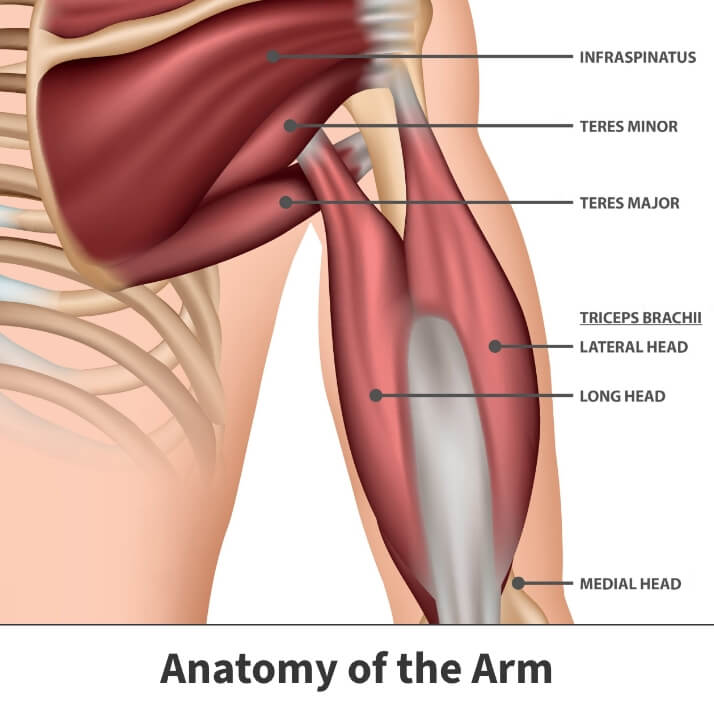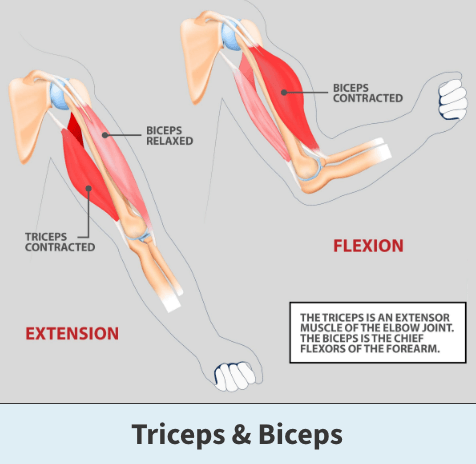Anatomy

The triceps is a three-headed muscle originating at several points along the arm, including right below the shoulder blade, the upper arm bone, and extending to the forearm. It enables you to extend your forearm and elbow joint.
About
The body contains parts called tendons which are strong, moveable tissues connecting muscles to bones. They play a major role in your ability to move and perform any type of exercise. The triceps tendon links the back of your arm bone and elbow joint together. Triceps tendonitis occurs when this structure becomes inflamed.
Causes
Inflammation can be the result of several possible causes. The most common is overuse over an extended period. If you work in a job requiring consistent movements, such as lifting and carrying, your chances of developing the condition increase significantly. Moreover, athletes who engage in repeated, throwing motions are also at a heightened risk.
Triceps tendonitis often follows one quick but severe event, like an automobile accident. Additionally, other less common reasons triceps-related tendonitis occurs, include chronic or heavy steroid use and certain diseases, such as diabetes and immune system disorders, like rheumatoid arthritis.

Symptoms
Specific symptoms and their severity depend upon the underlying condition.
Symptoms commonly experienced, include:
- Pain or tenderness in the shoulder, elbow, or anywhere else the triceps muscle extends
- Discomfort that appears or worsens when you use the triceps muscles
- Bulging, swelling, or redness around your elbow
- Gradual weakening in your shoulder, elbow, or anywhere else the triceps muscle extends
In acute events, like work-related incidents, sports injuries, or automobile accidents, you may hear a popping sound that indicates tendon damage.
In moderate to severe cases, your arm’s movability might be limited.
Diagnosis
If your doctor thinks you have triceps-related tendonitis, they will perform several tests designed to confirm their suspicion, which may include:
- Pressing on the arm – This enables your doctor to find any abnormalities in the tendon and surrounding muscle where there is tricep pain.
- Motion measurements – Your doctor may ask you to move your elbow or shoulder in specific ways or directions. The inability to move or bend these parts can indicate the presence of tendonitis.
If the initial results do not confirm the diagnosis, your healthcare provider may order body imaging examinations, like magnetic resonance imaging (MRI scans), X-rays, or ultrasound. Each of these tests allows a medical professional to look inside your body, which often makes confirming tendonitis’s presence easier.

Treatment
Fortunately, several treatment options exist. Your Florida Orthopaedic Institute physician will tailor the most appropriate therapeutic plan after considering key factors, including:
- Your age
- The specific underlying cause
- The tendonitis’s severity
- The symptoms you experience
Arguably, the most important consideration in determining treatment will be how significantly the condition impacts your ability to move and perform basic tasks.
Nonsurgical treatments
In mild to moderate cases, the first line of therapy is what is known as R.I.C.E. treatment. R.I.C.E. is short for four specific actions:
- Rest – You should rest the injured tendon as much as possible. This means avoiding all movement whenever applicable. Engaging in any heavy lifting or significant exercise is strictly forbidden until noticeable improvement has occurred.
- Ice – Many doctors recommend applying ice to the affected areas for at least 20 minutes several times per day. Icing reduces inflammation.
- Compression – Compressing the wounded tendon with compression bandages can provide added support to the injury and keep surrounding tissues from moving frequently or unnecessarily.
- Elevation – Raising your arm above your heart increases blood circulation to the damaged areas. Increased blood flow speeds up the healing process and decreases inflammation.
If you experience any type of discomfort, medication can help. Over-the-counter pain medications such as non-steroidal anti-inflammatory drugs (NSAIDs) may lessen pain. Examples are Advil or Motrin (ibuprofen) and Aleve or Naprosyn (naproxen).
If your injuries or pain is more severe, your doctor might prescribe other medicinal options, like corticosteroid injections.
Your physician may prescribe a course of physical therapy. Physical therapy sessions are led by a healthcare professional known as a physical therapist. This individual reviews your case and creates a selection of exercises geared toward helping you re-strengthen weakened muscles and tissues, in addition to recapturing lost mobility.
Surgical options
When nonsurgical methods prove unsuccessful or following severe, acute injuries, surgery might be necessary. Tendon surgery usually involves two types of procedures, repair, and replacement.
During a tendon repair procedure, surgeons repair the damaged triceps tendon and reattach it to a part of your elbow called the olecranon, which is a part of the ulna – a long bone extending down your forearm.
Should your tendon be severely damaged, tendon replacement may be needed. This undertaking, known medically as grafting, occurs when surgeons remove a tendon from another part of your body and replace the injured structure. In certain instances, grafted tendons might be made of synthetic materials.
Videos
Related specialties
- Arthroscopic Debridement of the Elbow
- Aspiration of the Olecranon Bursa
- Cubital Tunnel Syndrome
- Elbow Bursitis
- Elbow Injuries & Inner Elbow Pain in Throwing Athletes
- Golfer's Elbow
- Growth Plate Injuries of the Elbow
- Hyperextension Injury of the Elbow
- Little Leaguer's Elbow (Medial Apophysitis)
- Olecranon Stress Fractures
- Radial Tunnel Syndrome
- Tennis Elbow Treatment
- UCL (Ulnar Collateral Ligament) Injuries
- Valgus Extension Overload
